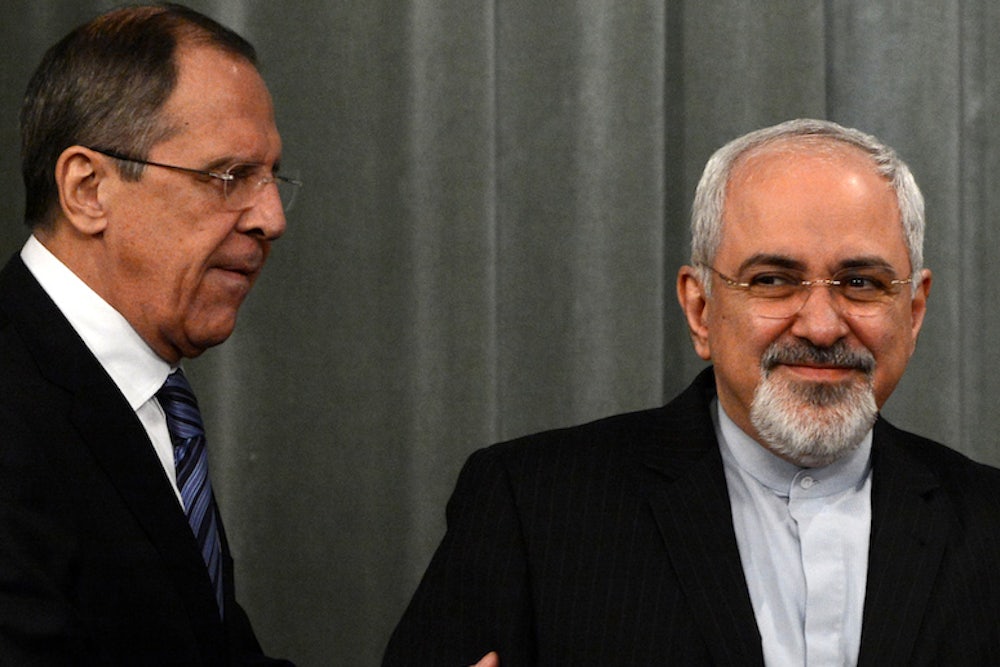A day after slapping travel bans on John McCain, Mary Landrieu, and John Boehner, Russia’s Vladimir Putin called today for a temporary halt in his tit-for-tat sanctions battle with the United States and the E.U. over his annexation of Crimea. But despite the truce—if it can indeed be called that—more serious battlegrounds between Russia and the West are already coming into view. On Wednesday, Russia gave the first real confirmation that the struggles over Crimea could leak over into the crucial ongoing multi-party talks on Iran’s nuclear program.
Regarding the talks between Iran and the P5+1 coalition, Russian Deputy Foreign Minister Sergei Ryabkov told Interfax News Agency, "We wouldn’t like to use these talks as an element of the game of raising the stakes, taking into account the sentiments in some European capitals, Brussels and Washington ... but if they force us into that, we will take retaliatory measures here as well." The subtext was clear to anyone familiar with gangster movies and their cliches: Nice nuclear weapons talks you got here … it’d be a shame if something happened to them. But as much as Russia clearly relishes the leverage it holds over the last best hope for President Obama’s foreign policy legacy, it’s unclear how much control they have over the success of the talks—or if scuttling them would even be in Russia’s best interest.
After all, Russia has been a constructive member of the Iran negotiations since 2006. Russian cooperation with the talks has been “pretty good so far, considering that … Russia tends to underestimate Iran's nuclear weapons potential,” says Gary Samore, President Obama’s advisor on weapons of mass destruction until 2012. Suzanne Maloney, an expert on Iran at the Brookings Institution, agreed that the Russians have been “more than cooperative.”
That’s because Russia and the West share the same vested interest in seeing the Iranian nuclear program slowed or halted. (Russia’s interest is arguably larger—its southern border is only 100 miles from Iran and the two countries have long sparred for influence in central Asia.) For the same reason it worked assiduously with the United States and the U.K. in the early 1990s to remove the nuclear threat of Ukraine, Russia is now willing to work with other members of the nuclear club to exclude Iran.
And the alternative to a successful nuclear deal—a preemptive attack on Iranian nuclear facilities by Israel, the United States, or their allies—is repugnant to Russia. “Ultimately, if the talks fail, the only alternative for the administration would be some use of force and that obviously isn’t in the Russians’ interest or to their advantage,” said Maloney. For this reason, she called a dramatic shift in Russian approach toward negotiations “highly unlikely.”
But Russia also recognizes that the Obama administration has staked a significant amount of political capital on the success of the Iran nuclear talks. “The door is open for the Russians to employ this linkage to their advantage,” Robert Litwak, director of international security studies at the Wilson Center, told me.
So how might the Russians go about this? None of the experts I spoke to expect Russia to pull out of the Iran talks outright. As Maloney noted, Russia’s presence in the talks is “a key part of their own influence,” and a boycott would remove that immediately while yielding little in the way of desirable results. Unlike a natural gas pipeline, delicate nuclear negotiations cannot be turned off and on at will.
In the New York Times yesterday, Mark Dubowitz, the executive director of the Foundation for Defense of Democracies, warned that Russia may try to undercut sanctions by opening up trade with Iran. “If you’re Putin and you think you’re going to be a target of sanctions, the most obvious leverage is in the Iranian file, where Russian cooperation is so important,” Dubowitz said. He referred specifically to a tentative barter deal in which Russia would supply Iran with unspecified equipment and goods in exchange for 500,000 barrels of oil a day. (The swap was first reported by Reuters in January and subsequently denied by the Russian government.)
The veracity of this specific deal aside, experts I spoke to expressed doubts about Russia’s ability to seriously harm the sanctions through unilateral trade deals. “If the Russians decided to conclude some major new trade pacts with the Iranians,” said Maloney, “obviously it would hurt the optics of our attempts to continue to apply pressure to Iran, but it probably wouldn’t mean a lot in terms of either the Iranian or Russian economy.”
That’s because Russia’s trade with Iran is minuscule—Russia accounts for only 1.8 percent of Iran’s foreign trade volume (Iran, for its part, trades with Turkmenistan more than it trades with Russia). The potential Iranian oil-for-goods deal would increase Iranian oil exports by 50 percent, but only because those exports have been so markedly reduced by the EU-U.S. sanctions regime.
Of course, securing a final deal in the P5+1 talks was already a massive uphill battle even without any potential Russian sabotage. As Samore told Jeffrey Goldberg in February, the current talks have almost zero chance of achieving the level of nuclear dismantlement that Western powers are demanding; the powerful influence of hardliners in Iran means that President Hassan Rouhani “cannot make the kinds of concessions necessary” to achieve a successful final deal. If Putin’s goal is to see Obama’s Iranian dreams come to naught, he might do best to just sit back and enjoy the ride.
